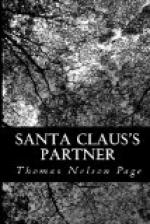James’s inquiry, “Shall you be dining at home to-morrow?” had recurred to him and now disturbed him. It was a simple question; nothing remarkable in it. It now came to him that to-morrow was Christmas Day, and he had forgotten it. This was remarkable. He had never forgotten it before, but this year he had been working so hard and had been so engrossed he had not thought of it. Even this reflection brought the spectral figures back sharply outlined before his eyes. They stayed longer now. He must think of something else.
He thought of Christmas. This was the first Christmas he had ever been at home by himself. A Christmas dinner alone! Who had ever heard of such a thing! He must go out to dinner, of course. He glanced over at his table where James always put his mail. Everything was in perfect order: the book he had read the night before; the evening paper and the last financial quotation were all there; but not a letter. James must have forgot them.
He turned to rise and ring the bell and glanced across the room towards it. What a dark room it was! What miserable gas!
He turned up the light at his hand. It did not help perceptibly. He sank back. What selfish dogs people were, he reflected. Of all the hosts of people he knew,—people who had entertained him and whom he had entertained,—not one had thought to invite him to the Christmas dinner. A dozen families at whose houses he had often been entertained flashed across his mind. Why, years ago he used to have a half-dozen invitations to Christmas dinner, and now he had not one! Even Mrs. Wright, to whom he had just sent a contribution for—Hello! that lantern-slide again! It would not do to think of figures.—Even she had not thought of him.
There must be some reason? he pondered. Yes, Christmas dinners were always family reunions—that was the reason he was left out and forgotten;—yes, forgotten. A list of the people who he knew would have such reunions came to him; almost every one of his acquaintances had a family;—even Clark had a family and would have a Christmas dinner.
At the thought, a pang almost of envy of Clark smote him.
Suddenly his own house seemed to grow vast and empty and lonely; he felt perfectly desolate,—abandoned—alone—ill! He glanced around at his pictures. They were cold, staring, stony, dead! The reflection of the cross lights made them look ghastly.
As he gazed at them the figures they had cost shot before his eyes. My God! he could not stand this! He sprang to his feet. Even the pain of getting up was a relief. He stared around him. Dead silence and stony faces were all about him. The capacious room seemed a vast, empty cavern, and as he stood he saw stretching before him his whole future life spent in this house, as lonely, silent, and desolate as this. It was unbearable.
He walked through to his drawing-room. The furniture was sheeted, the room colder and lonelier a thousand-fold than the other;—on into the dining-room;—the bare table in the dim light looked like ice; the sideboard with its silver and glass, bore sheets of ice. “Pshaw!” He turned up the lights. He would take a drink of brandy and go to bed.




